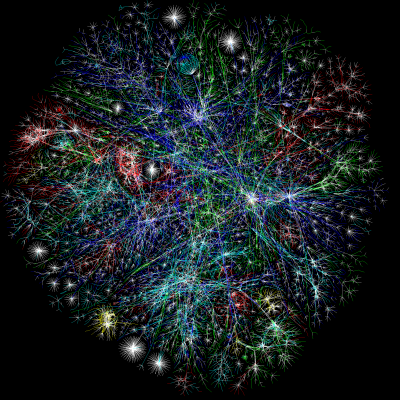The Net is a favorite punching bag for the dinosaurs of mainstream media. They might as well be punching the air. Who can tell the difference between virtual and reality anymore? No one.
The blurry line between ‘the Internet’ (the way grandmothers refer to the Net) and so-called real life became indistinguishable some years ago.
Clearly both the Net and consciousness are no longer a function of culture, in the old ‘discrete cultures’ sense of the word. Is the global culture the Net, and the Net human consciousness made manifest?
The Net is not just like human consciousness; it is a mirror, however distorted, of human consciousness. And like consciousness, it’s inane to speak of the Net as an abstraction, separate from oneself and society.
 The first thing to realize in reflecting on the Net is that it’s not just about technology. The Net is not first a technology, or a thing at all. It is an increasingly pervasive reality, a simulacrum or representation of human consciousness itself.
The first thing to realize in reflecting on the Net is that it’s not just about technology. The Net is not first a technology, or a thing at all. It is an increasingly pervasive reality, a simulacrum or representation of human consciousness itself.
The commentariat speaks of how “the Internet atomizes society and the depression this iteration of isolation engenders.”
“Iteration of isolation?” That’s nonsense. What they’re really talking about is society and social relations, primarily in the West but increasingly throughout the world.
In philosophy, the term “ghost in the machine” refers to Gilbert Ryle’s criticism of Descartes’’ mind-body dualism, which Ryle called “the official theory.”
“I shall often speak of it,” Ryle declared, “with deliberate abusiveness, as ‘the dogma of the Ghost in the Machine.’ I hope to prove that it is entirely false, and false not in detail but in principle. It is not merely an assemblage of particular mistakes. It is one big mistake and a mistake of a special kind. It is, namely, a category mistake.”
In speaking of ‘the Internet,’ I argue, people are also making a category mistake, projecting their own thoughts and fears onto the Net as a ‘Ghost in the Machine.’
In fact, I’m a ghost in the machine, and so are you. Whether that ‘ghost’ is intelligent or unintelligent depends on whether you and I are igniting insights within ourselves, or are stuck in man’s old, suffocating consciousness, creatures of conditioning manipulatable by others and AI.
Pundits speak of how “the nihilistic hate that passes for community in certain corners of the Internet is terrifying, unstoppable and, frankly, incomprehensible.” They’re referring to the ‘dark web’ in and of human consciousness itself, as community and culture in the anthropological sense break down. And that’s no more incomprehensible than humans and human consciousness.
“Social media” has become a meaningless term, as vacuous as Vice-President Pence’s recent praise of “word of mouth.” Both refer to something undeniably real but difficult to define, though everyone thinks they know exactly what they mean.
“Progress,” Will Durant said, “is the increasing control of the environment.” He missed the mark by a light year with that definition, and made things no clearer by archaically adding, “We must understand that each age and place needs and elicits some types of ability rather than others in its pursuit of environmental control.”
By this definition humans have succeeded to the point of decimating the earth. And the Net mainly represents man’s complete removal from nature, and culture in the traditional sense of the word.
Of course the Net isn’t just the ‘dark web,’ anymore than it’s pole-dancing schoolteachers on YouTube and fart kings on Instagram. This column only appears on the Net, and could not appear in the MSM, because the truth cannot, with rare exceptions, be written or spoken there.
Once in while, the truth does slip through in the MSM however, for example in this bracing bit from the Washington Post:
“The military, it seems, has decided it is a smart messaging move to co-opt and capitalize on Internet culture. This approach not only aims to sanitize the reality of international conflict and the killing that comes with it; it also aims to coolify it.”
Donald Trump has been a genius at exploiting the death of respectable narratives of reality, and it’s voices and gatekeepers are fighting a rear guard action against an enemy that has left the field. In this sense Trump is right about “fake news,” which is to say, the formerly acceptable narratives emanating from and filtered by the ruling classes.
Though Trump’s tweetstorms are an embarrassment to decent Americans, the MSM can’t resist obsessively covering them, caught as they are between the old crumbling reality, and a new one that is being created via the Net, for good or ill.
If you’ve gone this far, and are having insights of your own, perhaps there’s hope for the Net, for human consciousness, and for you and I.
Martin LeFevre


